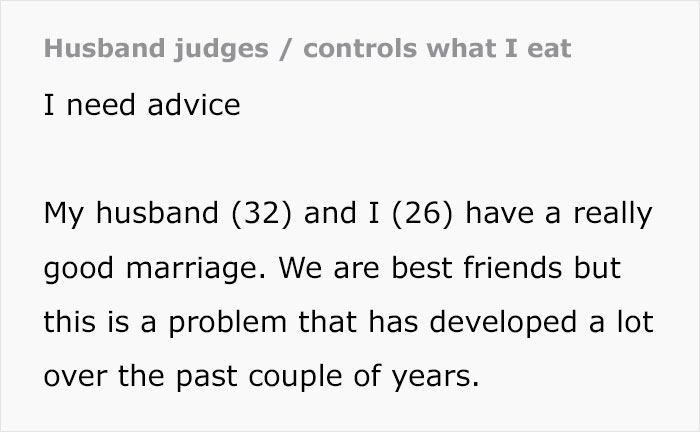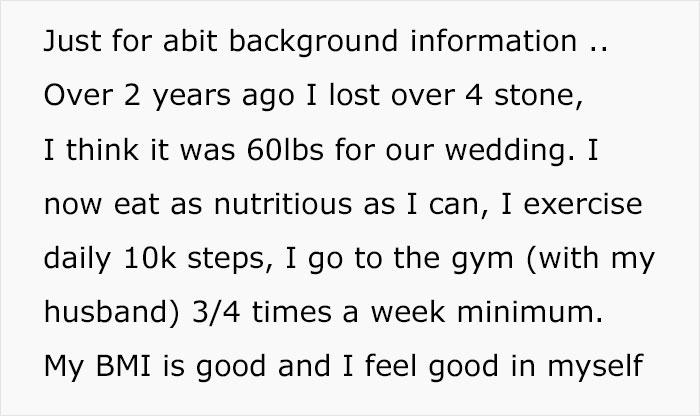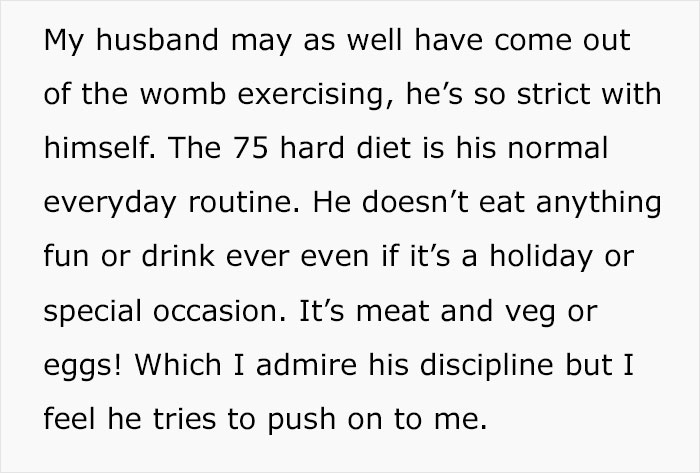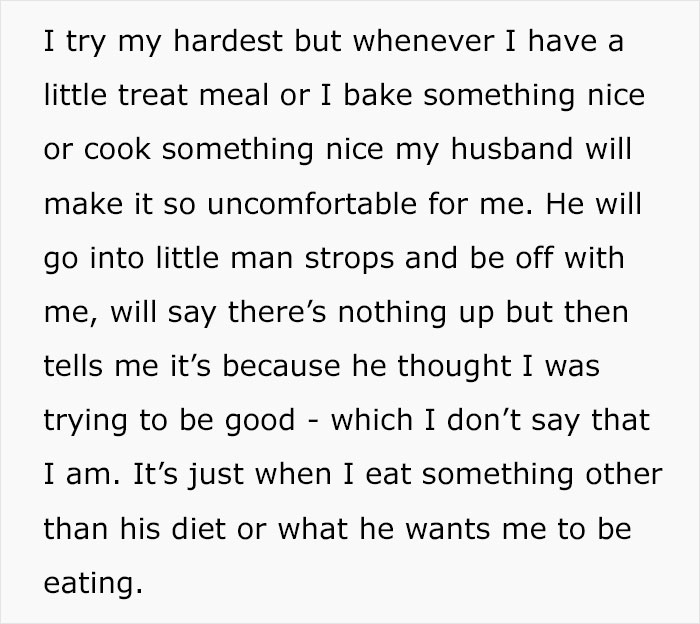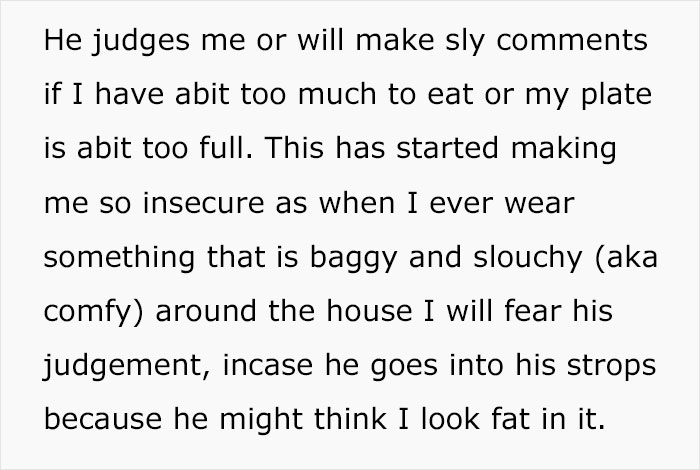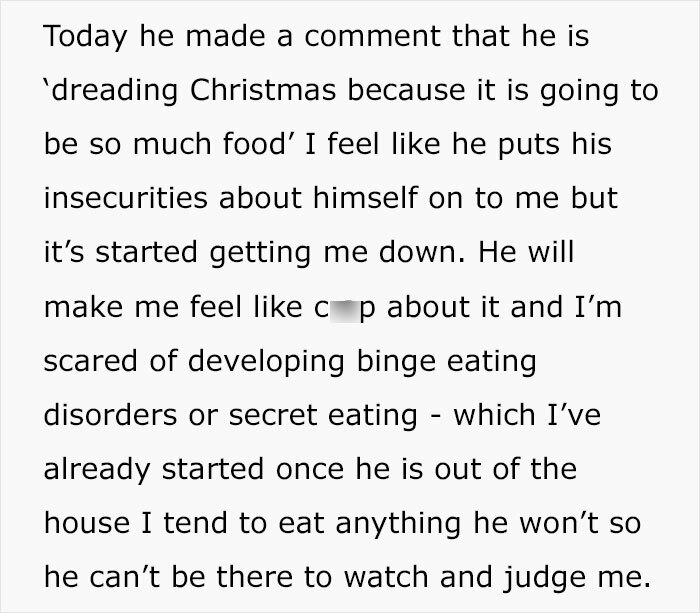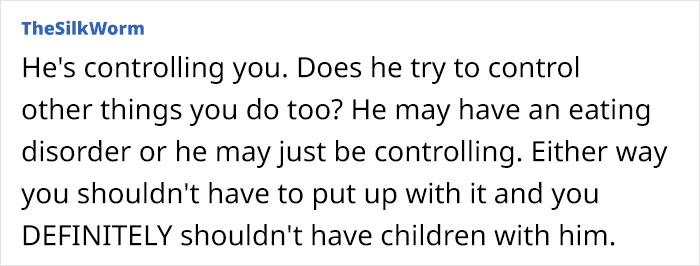Couple goals can be amazing—working out together, cooking healthy meals, and cheering each other on sounds great, right? But for one woman, her husband’s ultra-strict diet habits started spilling into her life in ways that weren’t so fun.
The woman shared online how, despite leading a healthy lifestyle herself, her husband’s disapproving comments and strict standards around food have left her feeling judged and insecure. What was once about staying fit turned into her hiding snacks and stressing over wearing comfy clothes, worried about his silent (and not-so-silent) judgments. Keep reading to see how diet extremes can sneak into relationships and the importance of balance in love and life.
It’s usually great fun when your partner is also your best friend and shares your interests—but sometimes it can get complicated
Image credits: Adam Winger / unsplash (not the actual photo)
A woman shared her journey into fitness, contrasting it with her husband’s extreme strictness around health and diet
Image credits: Karolina Grabowska / unsplash (not the actual photo)
She described how her husband frequently criticizes her eating habits, making her feel judged
Image credits: Guillaume Issaly / unsplash (not the actual photo)
The author sought advice online, expressing concerns about potentially developing eating disorders
Image credits: gtwasdjwn
Occasional indulgence is perfectly normal and healthy, but frequent binge eating can affect adults and teens alike, leading to potential health challenges
There are days when you just want to indulge in your ultimate comfort food—whether it’s a creamy bowl of mac and cheese or a rich chocolate pastry. These treats can feel like a well-earned hug after a tough week or a mini celebration after a big win. But if those indulgences become an everyday escape, it might be worth taking a closer look. Overeating once in a while is normal, but when it turns into a habit, it could signal something more serious, like binge eating.
Binge eating disorder isn’t just about overeating—it’s about feeling like you’ve lost control. It involves consuming large amounts of food in a short time and being unable to stop, even when you’re full. The difference between a regular splurge and binge eating lies in that overwhelming sense of compulsion.
Surprisingly, binge eating disorder is the most common eating disorder in the U.S. It doesn’t discriminate—it affects people across all racial and ethnic groups. About 1.25% of adult women and 0.42% of adult men struggle with it, along with 1.6% of teens aged 13 to 18. That’s a lot of people silently dealing with this challenge.
Why do we binge eat? It’s often a mix of emotional, biological, and learned behaviors. For some, food becomes a coping mechanism for stress, sadness, or boredom. The science behind it? Eating triggers a release of serotonin and dopamine—the “feel-good” hormones. This can create an addictive cycle where food feels like an emotional safety net.
One big sign of binge eating is eating to the point where you’re physically uncomfortable. Think of that overly stuffed feeling after Thanksgiving dinner—but happening regularly. It’s not about hunger anymore; it’s about something deeper driving the behavior.
Eating quickly happens to the best of us, especially when we’re starving. But if you’re always eating in a rush, barely tasting your food, it could be a red flag. Slow and mindful eating isn’t just healthier; it’s also more satisfying.
Another clue? If you find yourself eating snacks shortly after a full meal or avoiding meals in social settings because you’re uncomfortable with how much you eat. Binge eating often brings a heavy dose of guilt, shame, and regret. It can mess with your self-esteem and make you feel trapped in a cycle of eating to feel better, only to feel worse afterward.
Binge eating can have serious long-term effects on both physical and mental health, making it crucial to seek help when needed
Emotional stress is a common trigger, leading to what’s known as emotional eating. Some people may even start hoarding food, hiding snacks, or stashing goodies in secret places for later. This behavior might seem harmless at first, but it’s often a sign of deeper struggles tied to binge eating.
Beyond the immediate emotional impact, binge eating can lead to long-term health problems. Obesity-related risks like diabetes, high blood pressure, and heart disease are common. It can also cause or worsen anxiety, depression, and other mental health challenges, affecting the overall quality of life.
That’s why recognizing these signs and seeking support is so important. Whether it’s talking to a trusted loved one, consulting a therapist, or joining a support group, reaching out can make a huge difference. Help is always available, and taking the first step is key.
In the woman’s story, her husband’s restrictive behavior left her fearing she might develop this habit. What do you think about the husband’s behavior? How would you support someone going through this?
Many people online criticized the author’s husband for being overly controlling
[ad_2]
Source link

























